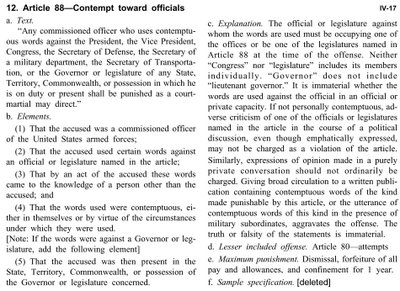Rising to the top of the avalanche
With this rich mother lode of material to draw upon, where does one begin? I usually find that larger patterns and more subtle meanings jump out at me, but there is nothing subtle about the trashing of this country, and the only pattern I can discern is the obvious one of the Bush administration’s every action being scandalous, inept, deliberately misleading, illegal, or all of the above, and where’s the interest in that? I don’t even want to think about it anymore.
But there are some things that can stand out even from this major onrush of new stories. The outspoken criticism from the retired generals is one of those things. And my major wonder is: what motivated them to speak out like they did, in the face of certain outcry and at the risk of drawing down the wrath of the Uniform Code of Military Justice upon their heads, via “Article 88—Contempt toward officials” in the Manual for Courts-Martial U.S. 2000 Edition (pdf, pg. 295):

Surely they knew full well what they were risking by speaking out. High ranks and assignments such as theirs aren’t handed out as readily as Presidential Medals of Freedom, after all.
So if they fully comprehended their risk of being punished for their public statements, why did they choose to take the risk? The obvious answer is that they believe so strongly in the parallel causes of truth and justice that their sense of duty compelled them to act as they did, and therefore their statements should simply be taken at face value.
But was there more to it? Everyone I know has expressed the concern that the Bush administration may be planning a coup d’état, with the intent of creating a crisis so severe (nuclear war?) that Bush declares a State of Emergency and suspends normally scheduled elections. Could it be that the retired generals were actually sending a strong, albeit subtle, message that such a strategy should not be attempted because Bush and his cronies would not have the support of the military in such an attempt? I dearly hope that was the message received.


0 Comments:
Post a Comment
<< Home